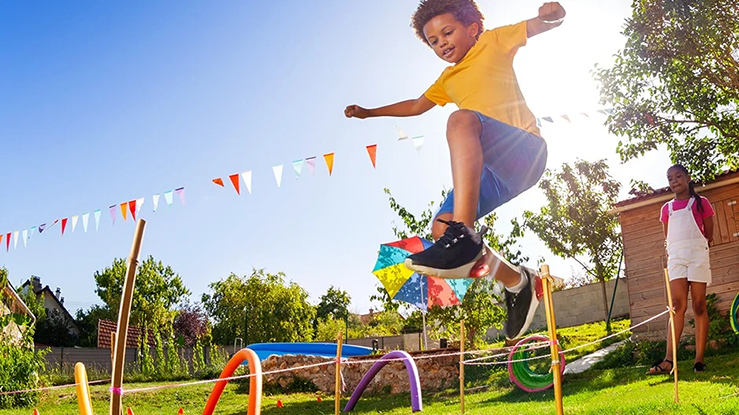Children have been spending more time indoors over the past few decades. They frequently spend their time indoors, like playing video games or watching TV, rather than doing morning work like collecting eggs or feeding goats. This change has led to less active living by limiting chances to be outside and perform physical activities.
We have also observed an increase in mental health problems and behavioral illnesses. Less physical play is often cited as a reason, but there are likely others. On a positive note, more teachers, doctors, and parents are beginning to understand how physical play can benefit children’s mental health. These are just a few:
It Encourages Emotional Expression
When trying to express their emotions, many children feel unsafe and overwhelmed. Some children might have experienced something terrible, or they might simply be feeling angry at a friend. They may even be thrilled or overjoyed, but they are unsure of how to express these emotions. The struggle might have something to do with the event, a specific person, or the child’s character. Kids may shut down or act out when they are unable to express their emotions.
Kids can work through their feelings and talk to their friends or family about them through physical play. As you push a child on the outdoor swings, they may come over to you. A group of kids playing soccer or hide-and-seek might provide another child with a safe place to share their thoughts. To express their feelings, kids might start to act out an event they’ve had or play make-believe.
It Enhances Social Skills
One of the best things about physical play is that it allows kids to interact with others. Most of the time, people play with others. To play a game, even a make-believe one, you mostly need at least one other person. Many children would not be called on because a team needed one more play if physical play did not exist. Many kids sat alone, wishing for friends, but they may not have enough in common.
However, to play a game of hide-and-seek, jump rope, or capture the flag, several children must work together, share, and take turns. These physical games help kids learn how to talk to each other, how to act, and maybe most importantly, how not to behave. Learning to read social cues from their friends is crucial for kids. They’ll be adults who can avoid big problems and learn to work things out.
It Relieves Stress
You’re probably already aware that almost everyone finds stress relief in physical exercise of some kind. According to a recent study, 75% of parents who were asked had noticed a rise in at least one bad emotion in their kids, such as worry, stress, or depression. Some people had seen more than one. If you don’t manage these feelings, they can turn into depression, anger, or even death. What are you going to do?
I know it sounds silly, but physical play can help kids cope with stress and even worry and depression, just like it does for adults. Kids can lower their feelings of stress by going into a field once a day to chase a ball. Both physical exercise and play raise endorphin levels in the brain. Playing in physical ways can help kids better control their feelings, work through stress, and release more of those important chemicals that make us feel positive.
It Reinforces Resilience
However, kids do not always get along while they are playing. Kids can be put in settings that are briefly stressful when conflicts arise. Not surprisingly, kids (and adults too) do better with these kinds of short-term worries. Long-term stress is bad for your health, but short bursts make you stronger. Resilient kids grow up to be adults who can handle challenging circumstances and “land on their feet.”
Teenagers and adults should not step in too quickly when they see kids fighting. Afraid of not having anyone to play with, tougher, bigger kids are more likely to be friendly to little ones. They can discover ways to agree and settle so that younger, weaker kids can stay in the game they’re playing. Kids often emerge stronger and better prepared for real battle later in life from both sides.
It Generates Imagination
The mind is a crucial aspect to consider. These days, many kids spend their time inside, in school, and in front of computers. They must be having a challenging time with their feelings. Kids struggle to be creative, innovative, or even just to have fun when they lack vision. These kids frequently grow up to be adults who struggle to find happiness or solve problems.
Kids learn to see things in new ways through physical play. Children can make up characters, act out situations, and come up with answers to made-up problems when they play active games like Simon Says, a treasure hunt, or an obstacle course with other kids. In addition, other kids will probably give them comments that help them think of new ideas. Instead of being a trait to lose, imagination can be a skill to improve.
You want your kids to be exhausted and somewhat dirty from physical play at the end of the day in addition to being well-educated. These things are beneficial for their minds, bodies, and emotions. Provide kids with the joy and, in today’s world, the luxury of a busy daytime filled with unstructured play that encourages them to move their bodies. They are likely to develop into adults who will express their gratitude to you.
